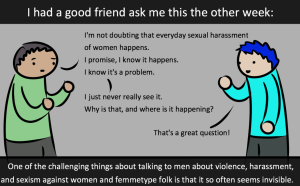Many people take their spouse’s last name when they get married — and there isn’t anything wrong with making that choice if it’s the right one for you and your partner.
Many women (yes, even feminist women) choose to take their partner’s last name for many varied and complicated reasons beyond “because it’s just what you’re supposed to do.”
These can include being more easily identified as a married couple, rejection of a family name after a history of abuse, an attempt to create a new identity to escape a stalker, or maybe they just don’t like the name they were born with.
The problem is, some people don’t know that they have other options.
The suggestions in this article are speaking largely to the experiences of women who are in relationships with men, as the traditions and customs I’m providing alternatives to are particularly strong in these relationships. However, as not all marriages are between men and women, marriages with different gender configurations may have different relationships to these traditions and customs. I hope people in all kinds of marriages can benefit from these suggestions and if you have any of your own to add, feel free to let us know!
Where the Tradition Comes From
As women, it is ingrained in many of us from a young age that we are to grow up, get married to a man, and take his last name as our own.
This norm stems from a long-standing tradition where a woman was quite literally considered to be the property of her husband.
When a woman got married, her ownership was transferred from her father to her husband, and the change in last name signified that.
Although we’ve thankfully moved beyond those days, the assumption that women must still take their husband’s last name is still rooted in these patriarchal customs, and accepting them without a second thought can perpetuate the oppressive narratives they are predicated upon.
More Than Sexism
Beyond its messed-up sexist roots, there are many more issues that come along with the assumption that a woman should take her husband’s last name.
To start, the assumption is incredibly heteronormative. It assumes that all women marry men — and that just isn’t reality.
So when marriages exist outside of hetereosexuality, it creates a litany of issues. Who should take whose last name? If you don’t take your partner’s last name, is your marriage less valid in the eyes of society and the law?
We also cannot ignore the power that names wield. Historically, names have been used as a powerful tool to oppress and erase marginalized people.
For example, for much United States history, women were subject to coverture laws which denied women a separate legal existence from their husbands. That meant that once a woman became married, she legally belonged to her husband and was not allowed to own property or control her own money.
Taking on her husband’s last name was a symbolic gesture of “subsuming” her identity to her husband’s.
The history of names for people of color is even bleaker. Indigenous Americans in particular were forced to take on Anglicized names as a systematic tool to erase their own identities and force their assimilation.
Black people were also often stripped of their African names when forced into slavery.
As communications scholar Sarah J. Jackson explained in a blog post discussing naming politics, “As a result of the stripping of identity, culture, and family that was a primary characteristic of the American slave system, the majority of African Americans have no knowledge of their original family naming traditions.”
On the flip-side, changing your name can also be hugely positive experience that allows you to take control of your identity, like when a trans person changes their name to match their identity.
A name change not only changes how the world perceives you, but also allows for folks to show the world how they want to be perceived.
These things all show us how tremendously powerful names can be in shaping our identities and how people perceive us. And as feminists, many of us want to explore our options before we decide what we should do with our own.
Here are four alternatives to taking your spouse’s last name.
1. Keep Your Last Name
This one probably seems obvious, but you don’t have to change your name at all.
About 57% of Americans think women shouldn’t have to take their husband’s last name — showing how much more acceptable this has become in our culture.
There are a multitude of reasons why you might just leave your name as is, and those include:
- Having your career tied to your name (like writers, journalists, and artists)
- Strongly identifying with your current surname based on its familial ties
- Your last name reflecting your heritage
- Really liking the way your name sounds
- Not liking your spouse’s last name
- Wanting to avoid the hassle of getting new identity documents and accompanying paperwork
- You’re a teacher and your students know you by your last name
- Being fed up with the sexist roots of taking your spouse’s last name
If your last name is an integral part of how you think of yourself or who you are, there is no reason why you can’t keep it.
2. Hyphenate Your Last Names
This is another option that has become fairly acceptable in common culture and can be a great compromise in the name-changing debate.
Hyphenating the surnames of you and your spouse allows for the best of both worlds by ensuring that both of you get equal representation.
You also will both be able to retain any professional connection to your work you may otherwise have to worry about if your name undergoes a major shift.
3. Take Your Spouse’s Last Name, But Keep Yours As Your Middle Name
Again, this is another practice that is fairly common and accepted (some even call it trendy). In fact, even Hillary Rodham Clinton opted for this.
Keeping your own last name as your middle name when you get married is said to be something of a Southern tradition that allows family names to live on even when marriage stands to eliminate them.
Typically, this could mean dropping your current middle name if you have one and adopting your maiden name in its place, but you could also have two middle names if thats what works best for you.
This can be a great option for those wishing to maintain their own sense of identity who are also concerned about future children having differing names from their parents.
It can also allow you to keep your own professional identity in the mix if you’re in a profession where your name is well-known or your body of work is attached to it.
Much like hyphenating your last name, this option allows people to still recognize who you are at a glance without making a big formal announcement that you’ll now be going by another name entirely.
4. Have Your Spouse Take Your Last Name
We don’t see this happen all that often, but men can take the last name of their spouse, too.
For all the same reasons a woman should consider whether she should or wants to change her last name, men should consider it too.
Now, this does leave many men feeling nervous. Since this isn’t common, there is some stigmatization around the practice. Some men who have made this decision say that reactions from family and friends to the news included a lot of jokes about their masculinity being at stake.
But if it’s right for you and your partner, don’t shy away from it.
However, it’s worth noting that the law isn’t quite as hospitable to men changing their last names when they say “I do” as it is to women.
Just six states — Georgia, Hawaii, Iowa, Massachusetts, New York, and North Dakota — allow for men to make the switch in the same way women can. Elsewhere, changing your surname is considered a separate legal act from marriage.
5. Make a New Last Name Together
Perhaps the most extreme (or maybe just creative) option is to collaborate with your partner and choose an entirely new last name.
This could mean a lot of things, including starting fresh, blending your two last names together, or picking a name with significance to your one or both of your families.
In a blog post, feminist activist and blogger Britni de la Cretaz wrote that she and her husband picked an old family name together.
Choosing a new name together “symbolize[d] our moving forward as equal partners who are forging a life together and becoming a family,” de la Cretaz explained. “It allows me to subtly spread my feminist ideas just by living my life the way I think it should be lived.”
***
Our names say a lot about who we are and where we come from, so it’s no wonder that taking your spouse’s last name has become a controversial talking point both within and beyond the feminist community.
And although we have many options, it is also important that we don’t judge or shame anyone’s decision. After all, if feminism is really about choices, then you should be able to take your spouse’s last name if you so choose without ridicule.
It’s their right, and we don’t need people to abandon their right to make that choice just to legitimize our cause.
But we do owe it to ourselves to consider our options.
[do_widget id=”text-101″]
Ally Boguhn is a Contributing Writer for Everyday Feminism and a feminist activist and media researcher living and working in Washington, DC. She completed both her B.A. in Communications and Art History as well as her M.S. in Professional Communications at Clark University, where she researched abortion debate rhetoric. Ally is also the founder and editor of Because I am a Woman, a blog devoted to intersectional feminism and reproductive justice. You can follow Ally on Twitter @AllyBoguhn. Read her articles.
Search our 3000+ articles!
Read our articles about:
Our online racial justice training
Used by hundreds of universities, non-profits, and businesses.
Click to learn more





















